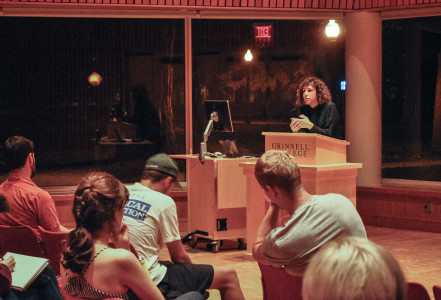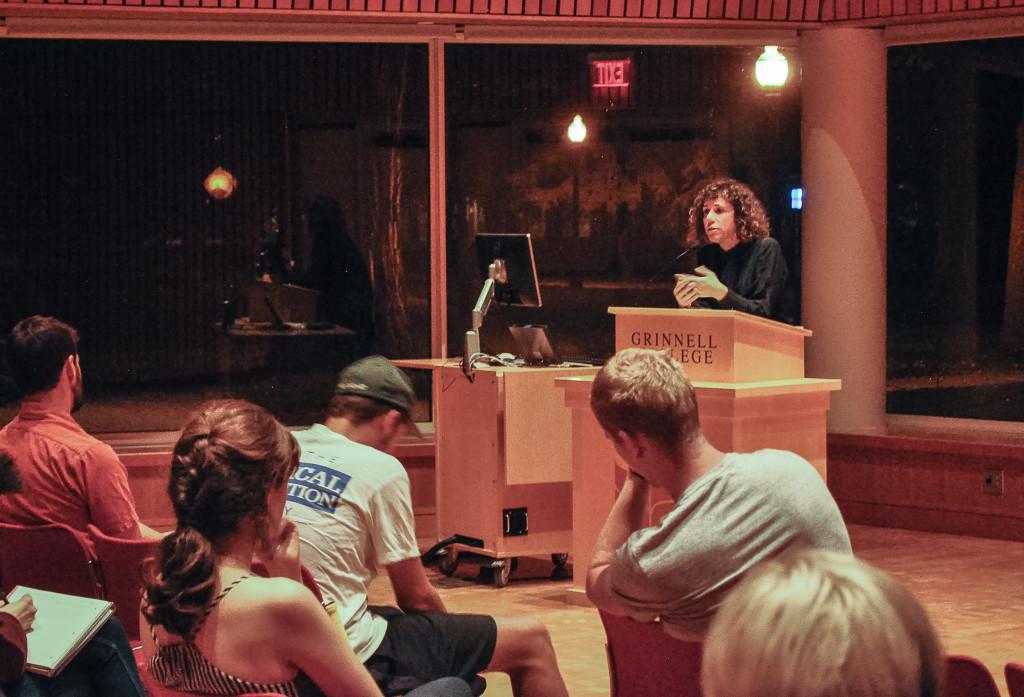Kelly Pyzik, Editor-in-Chief
pyzikkel@grinnell.edu
Jami Attenberg is an impressive contemporary novelist who makes her living writing from Brooklyn, NY. She writes freelance for publications like The New York Times, Vogue, Salon and The Hairpin, and is author to five novels including “The Middlesteins” and “Saint Maizie”. She conducted a roundtable discussion on Tuesday and then gave readings from “Saint Maizie” and her work in progress collection of short stories as part of the Writers@Grinnell this past Tuesday, Sept. 22 in JRC 101. The S&B’s Editor-in-Chief, Kelly Pyzik, sat down with Attenberg to talk about the post-grad wandering years and author-character relationships.

KP: You mentioned during the round table that you spent a number of years “fucking around” after college, which I found very inspiring, actually. What was your state of mind like during that time? Did you feel comfortable? When did you finally settle down?
JA: No, I didn’t know. I didn’t know what I was doing, I was just trying to figure it out. The first couple years I for sure was just having a good time and kind of running around. But I also did work for different non-profit organizations and interned at a couple of places. I was definitely trying to figure it out and I was using my time well. Then after that I really started moving all over the country. I had a really good time, but I was a little bit lost. I still think I got so much out of it. I learned how to be self-sufficient, I learned different skills that I could use. I developed my social skills. I had been such an internal person in college it was really great that I learned to see more of the world and talk to people. It took a little while for me to get my act together for sure. … Late twenties, it maybe took me a little bit longer. I couldn’t mess around anymore when I moved to New York because it’s so expensive there. I had to get it together. It was a lot easier when I lived in Seattle in the mid-90s: rent was really cheap, I just kind of hung out.
You spoke about advertising as a good way to develop your ability to write quickly, but said it’s a little soul-sucking. What was your experience with that?
The reason it’s soul-sucking is you’re working on clients you don’t necessarily believe in. I spent a lot of time working on advertising allergy medicine which in theory is, like, fine, but it didn’t feel like it was going to be my life’s work or anything. You work really long hours and you can sometimes have complicated relationships with clients or things like that. But, again, it was a really great way to learn to write fast and it was a good source of income and I made friends out of it and saw the world in a different way. I mean, any job experience you have is going to expose you to the world in a different way.
You write very sympathetic but realistic characters. How do you maintain that balance between sympathy and portraying flaws?
I really approach my writing from a compassionate place. I can’t write a book unless I know that I’m going to be able to be compassionate within that material and feel that way toward the characters. Even if I don’t feel that way toward them when I begin a book, I work toward that by the end of the book. People are just really complicated and layered and interesting and I aspire to love people for their flaws, so I try to write that way as well.
What does developing a relationship with a character you don’t originally love feel like?
I fall in love with them. Or I learn to love them, I guess I should say. You develop an affection for them.
Once you know them so well, once you know what their intentions are, it becomes easier to love them, even if they are flawed.
How did you write from the perspective of a 60-year-old man, like Richard in “The Middlesteins”?
I don’t know, I just knew him! I just felt like I knew exactly who he was. He’s probably a part of me. All the characters are a part of me. We’re more than just exactly who we are, you know? You probably have a 60-year-old woman in there somewhere, too. Sometimes when you’re doing something and you’re like, “God, I’m being such a cranky old man right now,” well, it’s like that’s what you’re going to be like some day in the future.
Because your books are so different, does it ever feel like they’re a reaction to each other?
I’m definitely consciously aware of. like, “The Middlesteins” was this close-third narrative, so I don’t want to write another book that’s close-third again for a while. And “Maizie” was set in the past but is also a variety of voices in first person, so then I was like, “You know maybe I could just do first person again, but stick with one character, one eye.” Once I’m done with something, I don’t need to do it again for a while. And, I wouldn’t want to write every book set in New York, I wouldn’t want to set every book in the Midwest. So, I am aware of what I have done and it does definitely inform what I’m going to do next.
Have you written most of your books in a place you’ve lived at some point? Do you find that easier?
Yeah… Yes. Most of them have been not really writing about anything I haven’t done before. Except for The Melting Season … part of it is set in Las Vegas, and I’ve been to Las Vegas but I’ve never lived in Las Vegas. And I’ve lived in Nebraska and part of it was set there, but most of [my writing] is in New York or the Midwest. … Location is important to me. …. I could write a book about China, I suppose, or wherever, but I’d have to really push myself to do it. It’s a cheat, it’s a bit of a cheat. But I’ve got to … I’ve got to cut myself a little slack.
With flash-forwards, like in “The Middlesteins,” how can you be sure to not reveal too much?
I actually had two that I cut out. I don’t know, I was writing them and it was very subconscious. I wrote them and then I had to go back and everything got tweaked a little bit. It felt good, the flash-forwards felt really good, and made sense for the book. But I did have two where I gave too much information and I felt like it was good that I knew that those moments existed in the future, but it didn’t think they need to be in the book. It was just a judgment call. I actually had two that I cut out. I don’t know, I was writing them and it was very subconscious. I wrote them and then I had to go back and everything got tweaked a little bit. It felt good, the flash-forwards felt really good, and made sense for the book. But I did have two where I gave too much information and I felt like it was good that I knew that those moments existed in the future, but it didn’t think they need to be in the book. It was just a judgment call.





























































